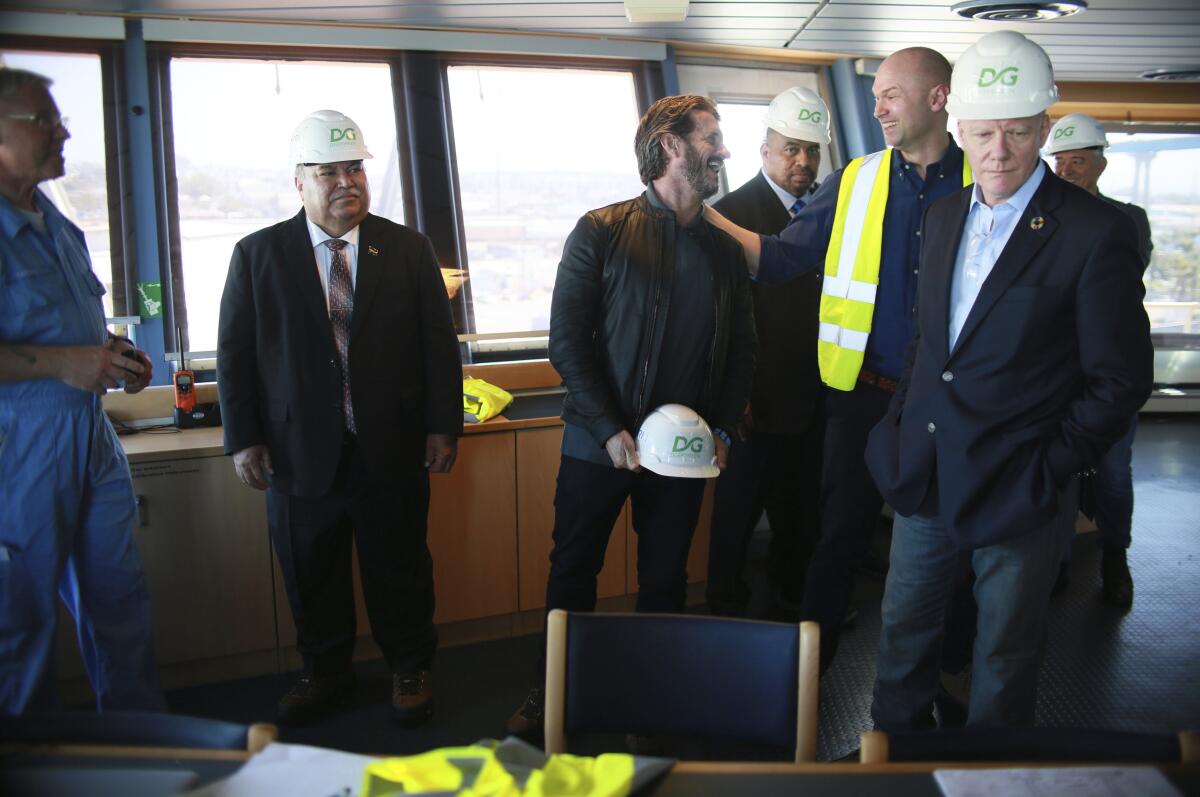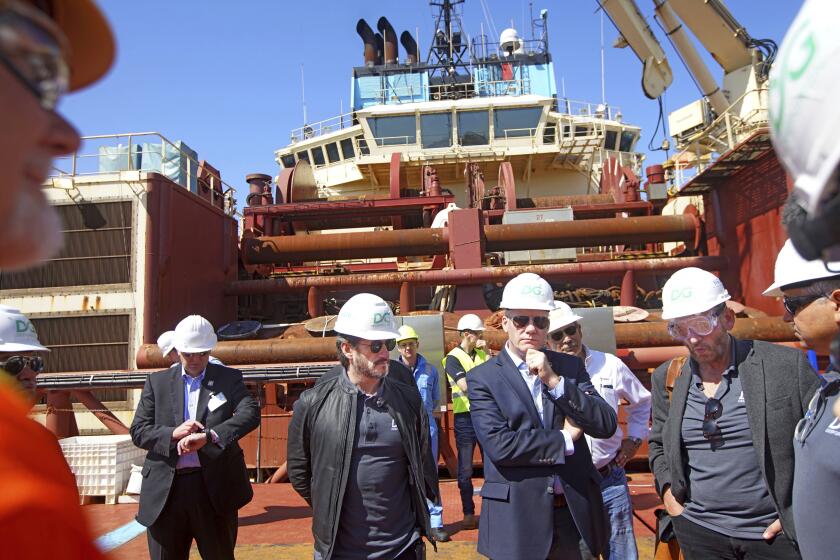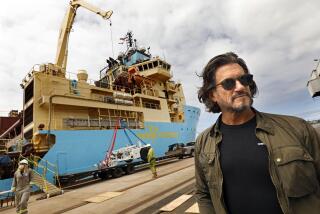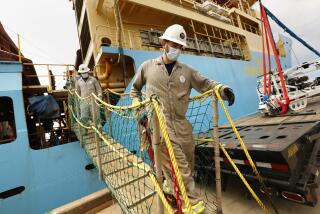Governments turn against deep-sea mining as EV boom drives demand for metals

- Share via
As battery makers scramble to procure cobalt, nickel and other metals to meet rising consumer demand for electric cars, governmental opposition to strip-mining the seabed for minerals is mounting.
The deep ocean contains the largest estimated deposits of minerals on the planet, potentially worth trillions of dollars. But in recent weeks, Chile, Fiji, Palau and other nations have called for a moratorium on ocean mining until there is a better understanding of the environmental consequences of destroying little-explored and unique deep-sea ecosystems that play an undetermined role in the global climate. French President Emmanuel Macron, meanwhile, expressed his opposition to seabed mining in June at the United Nations Ocean Conference in Lisbon, Portugal.
U.N. members states must “create the legal framework to stop high sea mining and to not allow new activities putting in danger these ecosystems,” Macron said on the sidelines of the conference June 30.
The pronouncements are striking, observers say, because those nations are members of the International Seabed Authority, the U.N.-affiliated organization created to regulate deep-sea mining. Three of the countries — Chile, Fiji and France — sit on the ISA Council, the organization’s 36-nation policymaking body that is meeting for the next two weeks in Kingston, Jamaica, to negotiate regulations that could allow mining to begin as soon as 2024.
Matthew Gianni, a longtime ISA observer and a founder of the Deep Sea Conservation Coalition, said in an email that he expects other nations to join the call for a moratorium. “Countries are finally recognizing the concerns expressed by scientists regarding the likely damage to the environment, fisheries, migratory species, biodiversity and ecosystem services such as carbon sequestration if deep-sea mining is permitted to go forward,” said Gianni, whose Amsterdam-based alliance represents more than 100 environmental groups and other nongovernmental organizations.
Pradeep Singh, an ocean governance scholar at the University of Bremen in Germany who studies the seabed authority, said the push for a moratorium by ISA member states “is a turning point in the negotiations” over deep-sea mining. “These calls for a pause or moratorium certainly do question the legitimacy” of seabed mining, Singh said in an email.
Mining firms want to scrape the seabed for minerals used in electric car batteries. Scientists worry about conflicts of interest with the gatekeeper to mining permits.
Ambassador Gina Guillén Grillo, who serves as Costa Rica’s permanent representative to the ISA and a delegate to the Council, said, “My country has many concerns regarding the push for starting the mining phase so soon. There is basically no information on the flora, fauna and ecosystems in the deep sea and seabed.”
“We have to remember that the seabed and its resources belong to humankind, so member states might also decide they don’t want to mine,” she added in an email. “They might instead wish to explore the potentiality of the amazing biodiversity for medicine, space aeronautics, cosmetics, fire resistance, etc.”
Google and automakers BMW, Renault, Volkswagen and Volvo have pledged not to use deep-sea metals for the time being, and 623 marine scientists and policy experts have signed a petition advocating a pause in seabed mining.
The ISA did not respond to a request for comment on the calls for a moratorium.
The U.N. Convention on the Law of the Sea treaty established the ISA in 1994 to regulate deep-sea mining in international waters for the “benefit of mankind as a whole” while ensuring “effective protection of the marine environment.
“This obligation is absolute, we cannot disregard it,” said Guillén Grillo. “We need time, resources for marine scientific research and for the whole international community to become involved.”
The ISA consists of 167 member states and the European Union. The U.S. is not an ISA member, as it has not ratified the treaty, but participates in the organization’s proceedings as an observer.
Since 2001, the ISA has issued exploration contracts to state-backed enterprises, government agencies and private companies to prospect for minerals over more than 500,000 square miles of the seabed in the Atlantic, Indian and Pacific oceans. Still, ISA has yet to approve mining regulations. Once it does, those contractors can apply for an exploitation license to start mining. Each mining contractor must be sponsored by an ISA member nation and pay it and the ISA royalties on the minerals mined.
Mining contractors have argued that deep-sea mining will have less of an environmental impact than terrestrial mining and is necessary to provide the metals needed for a transition to a fossil-fuel-free future.
The ISA Council had spent years working on mining regulations when in June 2021, Nauru, a small Pacific island nation, upended negotiations by triggering a clause in the Law of the Sea treaty that requires the seabed authority to approve mining regulations within two years.
Toward a more sustainable California
Get Boiling Point, our newsletter exploring climate change, energy and the environment, and become part of the conversation — and the solution.
You may occasionally receive promotional content from the Los Angeles Times.
Nauru is the sponsor of a subsidiary of the Metals Company, a Canadian-registered mining venture. If the ISA does not approve regulations by July 2023, it may be compelled to provisionally issue a mining license to the Metals Company under whatever environmental protections for the seabed are in place at the time.
Before Nauru triggered the two-year rule, the Metals Company had told potential investors it expected to begin mining in 2024, according to U.S. securities filings. The company had also estimated it would earn $95 billion from one area of the Nauru concession over 23 years of production. It said it expected to pay 7.6% of those revenues in royalties to Nauru and the ISA. The company’s share price declined to a 52-week low of 79 cents on Friday before closing at 88 cents.
“I don’t think a moratorium will become a reality,” Gerard Barron, chief executive of the Metals Company, said in a statement. “It would only curtail the deep-sea research the environmental NGOs are calling for and which TMC is undertaking in collaboration with leading independent research institutions.”
“Last year alone we spent tens of millions of dollars on our science program, and research teams clocked more than 170 days at sea carrying out studies that help us all better understand the deep-sea environment, in order to protect it,” he added.
The company holds ISA contracts to prospect for minerals in the Clarion-Clipperton Zone, a vast expanse of the Pacific Ocean between Hawaii and Mexico. The CCZ holds billions of polymetallic nodules, potato-sized rocks rich in cobalt, nickel, manganese and other minerals that formed over tens of millions of years at depths of 13,000 feet. The Metals Company has been testing prototypes of mining systems to collect nodules on the sea floor and transport them to a surface ship. If mining proceeds, Southern California ports are likely to serve as base of operations for some mine sites in the Pacific.
Scientists estimate that the nodules are habitat for half of the larger species in the CCZ. A study published July 7 in the journal Science found that industrial noise from a single mine in the CCZ could affect marine life within a 310-mile radius, adding to research documenting potentially harmful impacts of mining. Most species in the CCZ are new to science and up to 75% remain to be discovered, according to researchers.
“Part of the problem is that we don’t really know how sensitive these deep-sea species are to noise pollution, but we do know they live in a very quiet environment generally,” said deep-sea scientist Craig Smith, a co-author of the paper and an emeritus professor at the University of Hawaii.
Smith, a leading expert on the CCZ, said the potential ecological consequences of noise from mines that would operate around the clock for 30 years have been largely overlooked by regulators and mining companies.
An exhaustive review of all available research on areas of the deep sea targeted for exploitation released in March concluded that a lack of scientific knowledge about those ecosystems precludes effective management of mining. The authors of the paper published in the journal Marine Policy included prominent scientists and four members of the ISA committee that writes mining regulations.
Some member nations have long complained of a lack of transparency at the ISA while scientists, environmental groups and former ISA staffers have accused the organization and its administrative arm, the Secretariat, of being too close to the mining companies it regulates.
Those issues are likely to arise over the next two weeks at the ISA Council meeting in Jamaica, where a move to a smaller venue will limit attendance by outside observers, and at least one journalist has been denied credentials to cover the conference.
Andrew Thaler edits the DSM Observer, a trade publication that covers the deep-sea mining industry and the ISA. Before the COVID-19 pandemic, he said DSM Observer reporters had regularly attended ISA conferences in Kingston. But Thaler’s request for press credentials for this week’s meeting was denied because the ISA determined that his publication was not a “bona fide” media organization, according to an email denying accreditation.
“It does not seem that the Secretariat is particularly interested in engaging with media at the current moment,” said Thaler.
The ISA did not respond to a request for comment on media outlets denied access to the meeting.






